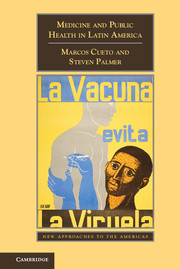Book contents
- Frontmatter
- Contents
- Acknowledgments
- Introduction
- Chapter One Indigenous Medicine, Official Health, Medical Pluralism
- Chapter Two National Medicines and Sanitarian States
- Chapter Three Making National and International Health
- Chapter Four Medical Innovation in the Twentieth Century
- Chapter Five Primary Health Care, Neoliberal Response, and Global Health in Latin America
- Conclusion
- Suggested Readings
- Index
- References
Chapter Two - National Medicines and Sanitarian States
Published online by Cambridge University Press: 05 December 2014
- Frontmatter
- Contents
- Acknowledgments
- Introduction
- Chapter One Indigenous Medicine, Official Health, Medical Pluralism
- Chapter Two National Medicines and Sanitarian States
- Chapter Three Making National and International Health
- Chapter Four Medical Innovation in the Twentieth Century
- Chapter Five Primary Health Care, Neoliberal Response, and Global Health in Latin America
- Conclusion
- Suggested Readings
- Index
- References
Summary
Latin American medicine and public health during the second half of the nineteenth century were not only fundamentally intertwined with the consolidation of nation-states; reforms in medicine and public health were central to state- and nation-building. States developed sanitary institutions and interests of unprecedented strength and ambition, whereas medical practitioners acquired group coherence and, individually and collectively, became important players in politics, institutions, and social supervision. Over the same period, due to the impact of positivist ideology, biological and medical metaphors organized the way modern nations and states were imagined. If most Latin American nations are not considered key players in international medicine and science today, the situation was different at the turn of the twentieth century, when a number of Latin American universities and research institutes were recognized as up-and-coming medical centers with young and talented researchers, colleagues of Europeans in their own right, close on the heels or ahead of their European counterparts and willing to participate as rapidly as possible in the crossfertilization of ideas.
At a continental or regional level, and viewed from a world perspective, Latin American medicine would play a unique role in the emerging global power of Western medicine in the age of capital and empire. This singularity was derived from the hybrid character of Latin American nation-states. Most were republican and independent yet susceptible to neocolonial power and intervention. State authority was consolidated in the cities and ports but had a much more precarious and intermittent presence in the rural areas. The wealth of these states was generated from primary products in rural or frontier zones with the labor of peoples of African, indigenous, Asian, and mixed ethnicity, yet urban elites defined themselves in relation to white European models and reiterated a Western metropolitanism. This meant that the region would be a dynamic frontier between Western and non-Western medicine. It would also mediate medical thinking about disease in tropical versus temperate climates and become the actual and potential site of unique discoveries that would electrify the emerging world of laboratory-based medical research and public health as an applied science. On all these levels, Latin American medicine and public health were acutely political, and even their most nationalist expressions were internationalist and cosmopolitan in origin, orientation, and networks.
- Type
- Chapter
- Information
- Medicine and Public Health in Latin AmericaA History, pp. 58 - 105Publisher: Cambridge University PressPrint publication year: 2014

